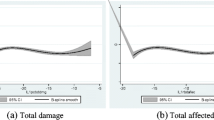Abstract
This paper uses the 1990–2010 natural disaster and carbon emission data of G20 countries to examine the impact of natural disasters and climate change on the natural capital component of inclusive wealth. Our study shows that climate change and GDP have no positive impacts on the growth of natural capital. By contrast, trade openness and natural disaster frequency contribute to the accumulation of natural capital in G20 countries. There is an inverted U-shaped relationship between the growth of natural capital and the magnitude of natural disaster. Natural capital growth is not affected very much by small disasters. By contrast, large disasters tend to make the growth of natural capital fall sharply.




Similar content being viewed by others
References
Albrecht F (2018) Natural hazard events and social capital: the social impact of natural disasters. Disasters 42(2):336–360
Baltagi BH, Li D (2002) Series estimation of partially linear panel data models with fixed effects. Ann Econ Financ 3(1):103–116
Benson C, Clay E (2003) The impact of drought on Sub-Saharan African economies: a preliminary examination, World Bank Technical Paper, Washington DC, March
Bordo MD (2007) Growing up to financial stability. NBER Working Paper 12993, March
Can M, Gozgor G (2017) The impact of economic complexity on carbon emissions: evidence from France. Environ Sci Pollut Res 24(19):16364–16370
Cavallo E, Galiani S, Noy I, Pantano J (2013) Catastrophic natural disasters and economic growth. Rev Econ Stat 95(5):1549–1561
Cuaresma JC, Hlouskova J, Obersteiner M (2008) Natural disasters as creative destruction? Evidence from developing countries. Econ Inq 46(2):214–226
Dell M, Jones BF, Olken BA (2012) Temperature shocks and economic growth: evidence from the last half century. Am Econ J Macroecon 4(3):66–95
Dercon S (2004) Growth and shocks: evidence from rural Ethiopia. J Dev Econ 74(2):309–329
Deschenes O, Greenstone M (2007) The economic impacts of climate change: evidence from agricultural output and random fluctuations in weather. Am Econ Rev 97(1):354–385
Drazen A (2002) Political economy in macroeconomics, Princeton University Press, Princeton, NJ, January
Edinaldo T, Laura B (2016) Climate change and economic growth in Brazil. App Econ Lett 23(5):377–381
Gassebner M, Keck A, Teh R (2010) Shaken, not stirred: the impact of disasters on international trade. Rev Int Econ 18(2):351–368
Gozgor G (2017) Does trade matter for carbon emissions in OECD countries? Evidence from a new trade openness measure. Environ Sci Pollut Res 24(36):27813–27821
Gozgor G, Can M (2016) Export product diversification and the environmental Kuznets curve: evidence from Turkey. Environ Sci Pollut Res 23(21):21594–21603
Hallegatte S, Dumas P (2009) Can natural disasters have positive consequences? Investigating the role of embodied technical change. Ecol Econ 68(3):777–786
Kim CK (2010) The effects of natural disasters on long-run economic growth. J Mich Busi 41:15–49
Klomp J, Hoogezand B (2018) Natural disasters and agricultural protection: a panel data analysis. World Dev 104:404–417
Lampietti JA, Dixon JA (1995) To see the forest for the trees: a guide to non-timber forest benefits. Environment Department working papers 13, Environmental economics series: Washington, DC, World Bank, July
Loayza VN, Olaberria E, Rigolini J (2012) Natural disasters and growth: going beyond the averages. World Dev 40(7):317–1336
Miao Q (2017) Technological innovation, social learning and natural hazard mitigation: evidence on earthquake fatalities. Environ Dev Econ 22(3):249–273
Mohan PS, Ouattara B, Strobl E (2018) Decomposing the macroeconomic effects of natural disasters: a national income accounting perspective. Ecol Econ 146:1–9
Noy IM (2009) The macroeconomic consequences of disasters. J Dev Econ 88(2):221–231
Noy I, Nualsri A (2007) What do exogenous shocks tell us about growth theories? University of Hawaii Working Paper, October
Park J, Son M, Park C (2017) Natural disasters and deterrence of economic innovation: a case of temporary job losses by hurricane sandy. J Open Inno 3(5):1–23
Pauw K, Thurlow J, Bachu M, Seventer DEV (2001) The economic costs of extreme weather events: a hydrometeorological CGE analysis for Malawi. Environ Dev Econ 16(2):177–198
Porfiriev B (2012) Economic issues of disaster and disaster risk reduction policies: international vs. Russian perspectives. J Int Dis Risk Red 1:55–61
Raddatz C (2009) The wrath of god: macroeconomic costs of natural disasters, World Bank Policy Research Working Paper Series, Washington, DC, March
Rodriguez-Oreggia E, De La Fuente A, De La Torre R, Moreno HA (2013) Natural disasters, human development and poverty at the municipal level in Mexico. J Dev Stud 49(3):442–455
Ruth M, Coelho D, Karetnikov D (2007) The US Economic impacts of climate change and the costs of inaction. The Center for Integrative Environmental Research (CIER), the University of Maryland, October
Sadoff CW (2006) Can water undermine growth? Evidence from Ethiopia. Agric Rural Dev 18, World Bank, Washington, DC, September
Sheng Y, Xu X (2018) The productivity impact of climate change: evidence from Australia’s millennium drought. Econ Mod
Skidmore M, Toya H (2002) Do natural disasters promote long-run growth? Econ Inq 40(4):664–687
Strobl E (2012) The economic growth impact of natural disasters in developing countries: evidence from hurricane strikes in the central American and Caribbean regions. J Dev Econ 97(1):130–141
Strulik H, Trimborn T (2018) Natural disasters and macroeconomic performance. Environ Resour Econ 2018:1–30
Tol RSJ (2009) The economic effects of climate change. J Econ Perspect 23:29–51
UNISDR (2015) Sendai framework for disaster risk reduction 2015–2030. United Nations, Geneva, March
United Nations Economic and Social Commission for Asia and the Pacific (2013) Building resilience to natural disasters and major economic crises. UNESCAP, Bangkok
Veen AVD (2004) Disasters and economic damage: macro, meso and micro approaches. Disaster Prev Manag 13(4):274–279
Author information
Authors and Affiliations
Corresponding authors
Additional information
Responsible editor: Nicholas Apergis
Rights and permissions
About this article
Cite this article
Fang, J., Lau, C.K.M., Lu, Z. et al. Natural disasters, climate change, and their impact on inclusive wealth in G20 countries. Environ Sci Pollut Res 26, 1455–1463 (2019). https://doi.org/10.1007/s11356-018-3634-2
Received:
Accepted:
Published:
Issue Date:
DOI: https://doi.org/10.1007/s11356-018-3634-2




